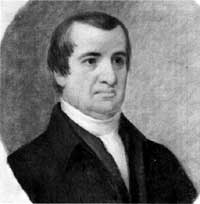Abraham Clark was an American lawyer, a delegate to the Continental Congress, and a signer of the Declaration of Independence. Abraham gave a great deal more for this country than many of us can imagine. He devoted his entire life to taking care of others and fighting for what is right.
Early Life & Education

Abraham Clark, by James R. Lambdin, after John Trumbull, completed in 1873.
Public domain image, Wikimedia Commons.
Abraham Clark was born on February 15, 1726. At a young age, his father noticed that Abraham was extremely sharp in math, so he hired an instructor to teach him surveying. Clark worked as a surveyor for many years. During this time, he taught himself law. When he felt that he had learned enough, Abraham started his own practice. He became an extremely well-respected lawyer in his area. Soon, people were calling him the “poor man’s councilor” because Clark accepted cases from people who were too poor to pay for a lawyer.
In 1748, Abraham Clark married Sarah Hatfield. Together, Abraham and Sarah had ten children. Clark became a member of the Essex Provincial Assembly, and soon after, he was elected Sheriff of Essex County. In 1775, he was elected a member of the Provincial Congress.
Politics
Trivia about Abraham Clark:
• Clark strongly supported the peoples’ rights. He refused to approve the Constitution until he was assured there would be a Bill of Rights.
• Historian Dennis B. Fradin credits Clark with insisting that American coins bear the word “liberty.”
• Fradin also writes that of all of his compatriots, Clark was most like a normal citizen. He wore no wig or ruffles. People trusted him to give sound advice. He hated pretense and wasn’t very ambitious. He was admired for his integrity.
Abraham was always very vocal with his opinion that America should break free from England. Meanwhile, at the Continental Congress, most of the New Jersey delegates were hesitant about declaring independence. They beleived it was too soon and Britain would crush the tiny colonial army. Because Congress needed the vote to be unanimous, most of the New Jersey delegates were replaced. On June 1, 1776, Abraham Clark was sent as a New Jersey delegate to the Continental Congress. Shortly thereafter, he signed the Declaration of Independence.
During the war, two of Abraham’s sons were taken as prisoners of war. They were held in horrible conditions and were tortured in terrible ways. One was starved, only eating what his fellow inmates could squeeze through the keyhole of his cell. His health suffered and he died quite young.
Abraham was offered a deal by the British: if he would recant his signing of the Declaration and defect to the Tories, he would have his sons returned to him. Even with his sons’ lives at stake, Abraham would not agree. He didn’t feel that men in power should use their positions for their own personal gain, so he didn’t even tell his fellow members in Congress that his sons had been captured until he learned they were aboard the HMS Jersey, notorious for its bad treatment of war prisoners. His sons were eventually released at the end of the war during a prisoner exchange.
Final Years
In 1778, Clark retired from Congress and served in various public roles for the remainder of his years. He passed away on September 15, 1794.


